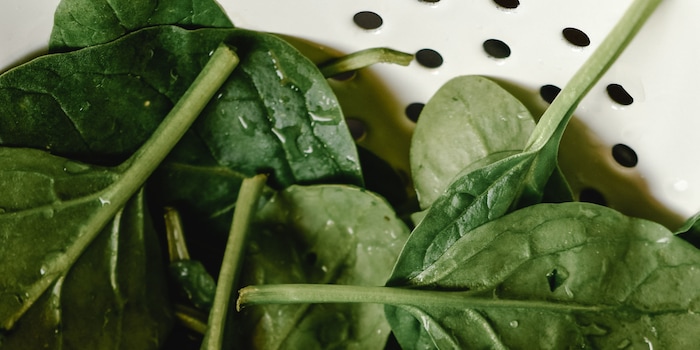
Guide
Dietary fibre: why it’s so important and how to eat more of it
by Anna Sandner

In essence, eating an alkaline diet means eating more fruits and vegetables in lieu of meat and dairy. There’s no question that’s healthy – but it’s only one side of the coin. Let’s dive into what alkaline baths and the like can do and what role our body’s own buffer systems play in the acid-base balance.
On a mission to eat healthier? Good for you! Following an alkaline diet may help. But what exactly does that entail? In a nutshell, consume as many so-called alkaline-forming foods as possible – mainly vegetables and fruits. «Eighty per cent of your diet should come from good alkaline-forming foods, and 20 per cent may be acid-forming foods,» says Viennese nutritionist Karin Pauer (link in German). Acid-forming foods include meat, fish, eggs, white flour and dairy products.
Following an alkaline diet means following this 80/20 split long-term. On an alkaline fast, on the other hand, you avoid meat and other acid-forming foods completely for one or two weeks; during this time, you’re only allowed alkaline foods. But what’s the point? We’ll be looking at what’s up with the alkaline fasting trend, alkaline nutrition in general, and what you should be aware of. Let’s start with the body.
Your body contains acids and bases. We need both to keep everything running smoothly. Acids and bases are measured on the pH scale, which ranges from 0 to 14. Acids have a рН below 7, while alkali or bases have a pH above 7. Ideally, your skin should have an acidic pH. Your stomach is also acidic, allowing your stomach acid to work in full force.
Blood, on the other hand, is slightly alkaline with a value between 7.38 and 7.42. «Acidosis in the blood due to small deviations in pH is life-threatening,» says the nutritionist. The same holds true for the reverse: your blood becoming too alkaline is also life threatening. That’s why the body has a whole series of so-called buffer systems whose task it is to keep the pH value in the blood constant. A healthy person’s body has no trouble doing this. Excess acids and bases are excreted by the kidneys in the urine.
Breathing also acts as a buffer. Anyone who has ever inflated an air mattress with their mouth knows as much; as you inflate the mattress, you exhale more and more carbon dioxide. This makes your blood more alkaline – too alkaline, and you get dizzy. If you stop blowing and switch back to normal breathing, the dizziness goes away. Pretty dang cool that we can influence our blood pH level just through breathing, isn’t it?
If a buffer system fails, whichever one is still functioning attempts to normalise the pH value again. So, if the body regulates the acid-base balance itself, what’s the point of an alkaline diet? Good question. On its website, the German Nutrition Society (DGE) (link in German) writes: «There’s no scientific evidence that acid-forming foods disrupt the body’s acid-base balance.» In other words, there are no studies that clearly prove or disprove the effect of alkaline fasting or the alkaline diet.
Pauer says, «In general, plant-based nutrition isn’t just about acids and bases.» The point is rather that fruits and vegetables are nutrient dense and provide the body with secondary plant compounds such as antioxidants, vitamins and minerals – and we need these for our metabolism to function well. In addition, our kidneys and liver need to perform in order to excrete whichever substances need excreting. We can unburden these organs with a diet rich in fruits and vegetables. This is why, according to Pauer, an alkaline-oriented diet generally makes sense for healthy people.
Alkaline bath salts as an additive for bath water are supposed to support an alkaline fast from the outside by stimulating the excretion of acids through the skin. Soaking in an alkaline bath is even said to work wonders against eczema. According to medizin-transparent.at (link in German), there’s no evidence to support this: «Whether an alkaline bath can help in the case of eczema hasn’t been studied.»
On the contrary, it’s possible that alkaline baths could even be harmful to the skin. After all, skin has an acidic pH, which it needs to prevent the growth of the wrong germs. Substances with a high pH value could disrupt this protective function, writes medizin-transparent.at.
In addition to alkaline baths, alkaline powders, dietary supplements and water with a high pH value are also touted. All of them are intended to counteract the dreaded hyperacidity of the body.
You can definitely do without meat once in a while and go for more vegetables instead. According to the DGE, it’s especially good to eat as many different types of fruit and vegetables as possible each week. This leads to a greater variety of secondary plant compounds being available to the body. According to the DGE, there’s evidence that this may be associated with a reduced risk of certain cancers. In addition, Pauer advises: «When choosing your acid-forming foods, go organic and also include vegetable protein sources in your diet.» You can opt out of alkaline products, such as bath salts, without worry or a guilty conscience.
Header image: Eva Bronzini via Pexels
The adjectives that describe me? Open-minded, pensive, curious, agnostic, solitude-loving, ironic and, of course, breathtaking.
Writing is my calling. I wrote fairytales age 8. «Supercool» song lyrics nobody ever got to hear age 15 and a travel blog in my mid-20s. Today, I’m dedicated to poems and writing the best articles of all time.
Practical solutions for everyday problems with technology, household hacks and much more.
Show all